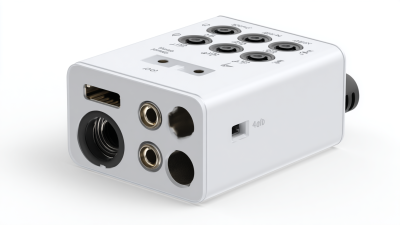


In today's fast-paced business environment, effective networking is essential for success, particularly in the B2B landscape. As companies increasingly seek innovative ways to enhance their connectivity, the role of tools like the "Pitch Btb Connector" has become paramount. According to a report by LinkedIn, 85% of jobs are filled through networking, underscoring the critical need for seamless connections in the business realm. Furthermore, data from the Harvard Business Review indicates that strong professional relationships can lead to a 50% increase in sales productivity. The Pitch Btb Connector serves as a vital instrument in establishing these connections, enabling businesses to communicate their value propositions effectively and engage potential clients with precision. By understanding the nuances of this connector, organizations can unlock new avenues for collaboration, resulting in sustainable growth and competitive advantage in the marketplace.

In today's rapidly evolving business landscape, the importance of B2B connectors cannot be overstated. These connectors serve as vital links between businesses, facilitating collaborations that can lead to innovative solutions and increased revenue streams. By fostering effective communication and trust among partners, companies can harness the collective strengths of their networks, ultimately driving growth and success.
Tip 1: Identify key players in your industry who can become potential B2B connectors. Attend industry events, webinars, or networking functions where you can meet these influential professionals and establish meaningful relationships.
Furthermore, modern networking strategies should prioritize the integration of technology alongside traditional methods. Digital platforms provide avenues for connecting with a wider audience, allowing businesses to streamline communication and enhance their visibility. Utilizing data analytics can further refine your approach, helping to identify gaps and opportunities within your network.
Tip 2: Leverage social media platforms to showcase your expertise and engage with potential connectors. Regularly share valuable content and insights that resonate with your target audience to build credibility and attract like-minded professionals into your network.
Utilizing B2B connectors effectively can transform the way businesses operate, allowing them to adapt more swiftly to market demands. By focusing on strategic alliances and nurturing these relationships, companies can not only survive but thrive in a competitive environment.

In today's highly competitive business landscape, mastering the art of pitching is crucial for ensuring effective networking and achieving robust returns on investment (ROI). According to a recent report by HubSpot, companies with a clearly articulated pitch increase their chances of closing deals by 57%. Moreover, a well-structured business pitch can enhance client engagement, leading to an average increase of 20-30% in referral business, as noted in the 2022 Business Growth Trends report.

Measuring the ROI of effective business pitching goes beyond just closing deals; it also involves evaluating long-term relationships built through those pitches. A study by the American Marketing Association highlights that businesses with strong pitch strategies report a 75% increase in client retention rates. This means that a good pitch doesn't just secure immediate sales; it fosters trust and loyalty, which translate into sustained profitability over time. In essence, understanding these key metrics not only underscores the significance of effective business pitching but also illustrates its critical role in driving sustainable growth.
In the ever-evolving landscape of B2B marketing, understanding your target audience is essential for driving success. Data-driven approaches have become a cornerstone for effective B2B strategies. By leveraging advanced machine learning models, companies can prioritize leads more effectively, allowing sales and marketing teams to focus on the prospects most likely to convert. According to recent industry insights, organizations that employ lead scoring based on AI-driven analytics experience a significant boost in both efficiency and conversion rates.
Furthermore, the rise of influencer marketing within the B2B sector indicates a shift in how brands build trust and credibility. Research shows that B2B consumers increasingly rely on peer recommendations, with trust becoming the new currency in influencer strategies. Data from comprehensive studies reveal that B2B marketers who effectively collaborate with influencers see higher engagement levels and foster lasting partnerships. This underscores the need for businesses to not only identify their ideal audience but also to strategically connect with influencers who resonate with that audience, enhancing their overall marketing efforts.
As companies prepare for future trends in B2B sales, integrating technology with marketing strategies emerges as a critical factor. The convergence of AI in both adtech and martech offers actionable insights that can enhance full-funnel growth. Harnessing these innovations not only equips businesses to adapt to changing market conditions but also positions them to outpace competitors and sustain growth amidst uncertainties.
Crafting an effective pitch is crucial for networking success, especially when it comes to B2B connections. Industry leaders emphasize the importance of clarity and conciseness in any pitch. Begin by clearly defining the value proposition; what sets your offering apart from competitors? This should be conveyed in a few compelling sentences that capture attention quickly. Avoid jargon and focus on the specific problems your product or service solves. Engaging storytelling can also enhance your pitch, making it relatable and memorable for your audience.
In addition to clarity, emotional connection plays a vital role in a successful pitch. According to experts, building rapport with potential partners or clients can make a significant difference. Sharing personal experiences or testimonials can humanize your message and foster trust. Furthermore, adapting your pitch to the audience's needs demonstrates a genuine interest in their success, creating a more personalized experience. By focusing on these best practices and learning from industry leaders, professionals can master the art of pitching B2B connectors and unlock new networking opportunities.
This bar chart illustrates the importance of various networking strategies based on survey data from industry leaders. The metrics showcase how businesses perceive the effectiveness of different networking approaches in achieving success.
In today's fast-paced business landscape, leveraging technology has become essential for seamless networking and establishing valuable connections. According to a report by Gartner, companies that effectively utilize networking technologies can increase their productivity by up to 25%. The advent of digital platforms has revolutionized the way businesses connect with potential partners, clients, and stakeholders, enabling them to foster relationships that drive growth.
Platforms like LinkedIn and specialized business networking tools such as Brella or HoneyBook offer unique features that facilitate networking opportunities. A recent survey by LinkedIn revealed that 85% of jobs are filled through networking, highlighting the importance of cultivating an extensive online presence. These platforms not only allow users to showcase their skills and expertise but also help in discovering potential collaborations. Furthermore, data from the Pew Research Center indicates that 77% of professionals believe that technology has significantly improved their ability to network effectively, showing a clear correlation between tech adoption and networking success.
As businesses continue to adopt these innovative tools, understanding how to leverage them is key to unlocking new opportunities. Effective networking can lead to strategic partnerships, valuable insights, and ultimately, increased competitiveness in the market. The integration of technology in networking practices not only streamlines the process but also creates a more dynamic and accessible environment for professionals across various industries.
| Connection Type | Purpose | Technology Used | Platform Examples | Benefits |
|---|---|---|---|---|
| One-on-One | Direct Networking | Video Conferencing | Zoom, Microsoft Teams | Personalized interaction, relationship building |
| Group Networking | Knowledge Sharing | Webinars | Webex, GoToWebinar | Broader reach, collective insights |
| Social Media | Brand Awareness | Social Platforms | LinkedIn, Twitter | Enhanced visibility, engagement opportunities |
| Networking Events | Lead Generation | Event Management Tools | Eventbrite, Meetup | Direct contact with potential clients |
| Online Communities | Support and Collaboration | Community Platforms | Slack, Discord | Peer support, knowledge exchange |






